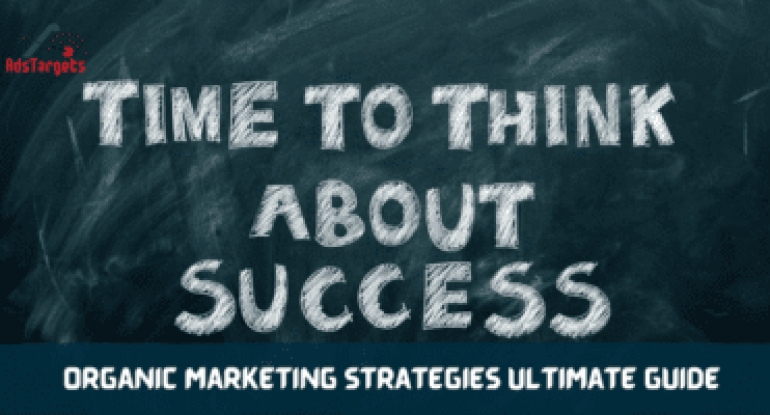Effective organic marketing generates permanent traffic sources for your website and business. It attracts customers to your business naturally over time.
Organic marketing also convinces search engines that your site is relevant to what your audience is looking for.
This form of marketing encourages an emotional connection between marketers and their customers, which is a key driver of a positive brand experience.
Through content that is focused on helping, entertaining, or educating your customers, organic marketing allows marketers to connect to these customers without barriers.
Your research and analytics may have one idea of the people you should be targeting, but there might be a surprising group of prospects looking to use your product in different ways.
By leveraging organic marketing, marketers can optimize for covering and reaching both.
Once you have sorted your organic marketing strategy, you have a deep-rooted way to build brand awareness that requires a little extra effort.
I think you should know this: while organic marketing is gaining so much ground to become so impactful, it doesn’t necessarily defeat paid advertising.
In this article, I will take you through the meaning of Organic marketing, how to get started, and the importance and strategies to adopt in your organic marketing campaigns.
Table of Contents
ToggleWhat is Organic Marketing?
Organic marketing is a digital marketing strategy that helps marketers naturally generate traffic to their websites rather than use paid marketing methods.
When you walk into a grocery store, buying organic may cost you some dollars — but when it comes to marketing, this is an affordable strategy that pays dividends for years to come without demanding a dollar from you.
Investing time and energy in creating an organic marketing strategy is one of the most vital steps you can take to ensure the deep-rooted success of your business’s digital presence.
Why? It’s one of the most effective ways to build a genuine audience and fan base for your product. Organic marketing can take up a lot of time, consistency, and patience to pull and pay off, but it is worth the extra effort, especially in the long run.
If you have been putting your blood, sweat, and tears into revising and reinventing your user experience, maintaining Facebook and Twitter accounts, building your email lists, and improving your SEO, the good news is you are doing organic marketing already. Now, let’s take a closer look at why it’s effective, and how you can do it better, continue reading

Why is organic marketing important?
While organic marketing refers to tools and paths that do not depend on paid marketing strategies, let’s be clear on this — no time investment is free.
Organic marketing demands attention and care; for instance, your business might put a brand-specific spin on a Twitter trend, making use of a new hashtag that climbs your tweets to the top of a feed.
This is organic floating (you don’t back it up with dollars), and yet it has caught eyeballs and is gaining a grip on the market.
In greater detail, below is why organic marketing is considered effective:
#1. It Takes Time to Experiment, Giving Marketers the Room to Make Mistakes (s)
Organic marketing is a wonderful tool because of how fresh it feels, when it comes to paid promotion, you want to ensure you get a good ROI.
But with organic marketing, there’s room for experimentation—allowing you space to make mistakes, letting you learn from your mistakes as it helps build resilience in your marketing.
. Maybe you want to try out a fresh campaign or strategy but are not sure how it will perform.
Organic marketing is a perfect way to give it a shot — if it fails, yes you have lost some time, but you didn’t lose hundreds or thousands of dollars trying to boost it.
This gives companies some freedom and wiggle room to play in their sandbox and attempt new tools. Plus, paid marketing can sometimes feel too sales-y; organic marketing can be more conversational and natural to give different segments of your list something unique to engage with.
#2. Marketers Still Have Time to Prioritize the Customer Journey
Paid marketing can be an effective tool within a high-dollar marketing strategy, but if the customer arrives at your website and doesn’t find what they are looking for, how is that investment working for you?
Organic content, too, needs to have specific landing pages. If a sponsored article draws followers in but a discrepancy in expectation chases them off, what’s the benefit there?
Organic marketing is a long process, but ultimately it will yield more genuine customer engagement and more accurate SEO.
#3. Sets Marketers Up for Success
The variety they say is the spice of life, but beyond that, it is the key to a robust digital presence. Create an organic marketing action plan that incorporates diverse actions that you can include into your business-as-usual days and your heavy lifting days.
You can do this by rereading and reconsidering descriptions and blurbs dotted throughout your website. Check for accuracy and update any out-of-date information and links in your campaigns.

Strategies To Optimize Your Organic Marketing Campaigns
#1. Examine your current traffic habits.
To build an organic marketing strategy, you should examine your audience’s current traffic habits on your website and then compare them to your ideal target audience.
First, it’s vital to know where you attract the most organic traffic currently. Is it from your YouTube channel, email newsletters, or blog posts?
Then, think about how your ideal audience normally discovers a business like yours. Do they rely on industry publications, social media, or review websites?
It’s important to understand what type of organic traffic your ideal audience is consuming so that you can create and serve them that content.
Additionally, you need to understand what organic traffic is already working for your brand so you can continue creating that content.
Organic marketing only works when you sincerely understand your target audience and what they want to see.
#2. Create Evergreen Quality content.
Once you know which platforms you want to focus on and where your ideal audience spends their time online, then it’s time to start creating content, quality content.
However, before you can just craft content, you need to brainstorm the types of content assets you want to create and build a list of several ideas.
For example, if you want to focus on blogging, do keyword research and competitor analysis, and then build a list of keywords you can create content around. Then, you can start creating your content.
However, if you want to focus on creating research or case studies, you will have to do first-hand research, and then decide how you will publish your findings.
Before you can create content, you will need to know which platforms you want to focus on.
AND Consider what your customer wants to learn and tailor your content to meet that need, keeping your content clear and informative.
Also, prioritize evergreen content instead of dated or trending stories. Experiment with engaging influencers to write guest posts to make your organic content more engaging.
#3. Develop an email marketing strategy
Email marketing keeps you connected to a routine customer base, offering newsletters with company updates, promotions, and announcements about sales and new products and services.
Effective email marketing campaigns can improve your eCommerce by leveraging deals and promotions to drive customer engagement.
Many email service providers (or ESPs) companies allow you to build email lists, craft emails, and send them, offering services to make starting an email marketing campaign reachable and affordable.
#4. Optimizing your website for a high organic search ranking
Before you dig into some of the more technical ways to boost SEO ranking, always remember that writing high-quality content that attracts interest and compels site visitors to share it and link back to it is vital.
Quality content has the best chance of being viral content, and Google rewards content virality beautifully in its rankings algorithm.
To ensure you are meeting Google’s standards for high-quality content, invest in quality writers, back up your content with expert sources (websites with high domain authorities), and ensure you cite those sources accordingly.
AND optimize your website’s landing page to help improve the user experience.
#5. Evaluate and improve.
Lastly, the key to any organic marketing strategy is to evaluate and improve. You can use tools to plan your SEO strategy, optimize your content, and measure real return on investment (ROI).
A tool will help you measure and keep track of your KPIs so you can see what’s working and what`s not.
Organic marketing is all about attracting people to you, instead of reaching out to people through paid methods.
With organic marketing, you will create multiple types of content to keep people engaged and interested in your brand and product. When it comes time to make a purchasing decision, they will think of you first.
Organic Marketing Platforms
#1. Search engine optimization (SEO)
SEO is an important marketing strategy for businesses of all types. Showing up in Google search results for relevant keywords can drive targeted, steady-quality traffic to blog posts, landing pages, and product pages.
Interestingly, SEO is very popular for B2B brands, which see an average of 70% of their returns coming solely from this channel.
B2B brands tend to focus heavily on SEO because it produces great ROI and it provides an alternative to expensive PPC search advertising and competitive social media algorithms.
To win with SEO, ensure to use a keyword research tool like Ahrefs to target a strategic mix of keywords based on their competition score and estimated monthly search volume.
#2. Social media marketing
93% of marketers engage in one form of social media marketing. That’s unsurprising because 4.7 billion people around the world utilize at least one social media platform regularly.
Marketers work hard to get their content in front of their ideal audiences on social media. They might encourage their email subscribers to follow them, or leverage hashtags and audience engagement to grow their social media following.
Social media is perfect for staying top of mind through fun, simple content and for promoting bigger pieces of content webinars, and ebooks.
#3. Lead magnets
Lead magnets are a necessary strategy for organic marketing. While they are not really a channel in themselves, they are worth mentioning because they can positively influence your success on other platforms.
You can leverage lead magnets to convert blog readers and social media followers into leads. For this reason, they are considered to be part of the middle of your marketing funnel.
SEO and social articles deliver traffic, lead magnets turn that traffic into leads, and email marketing and nurturing convert those leads into paying customers.
Lead magnets come in a variety of formats:
#1. Ebooks
#2. Templates
#3.Checklists
#4. Video courses
#4. Email marketing
Email marketing is another great organic marketing platform.
Typically, email marketing is used during the lead nurturing phase to convert leads into buyers. Marketers will provide lead magnets in exchange for email addresses, and then follow up with nurture sequences full of relevant content.
However, you can also promote your email content without using a lead magnet. For instance, you might have a landing page featuring positive reviews of your email newsletter and utilize that page to convert more people into subscribers.
#5. Affiliate marketing
Affiliate marketing is another powerful organic strategy because it allows you to tap into the organic audiences of influencers, coaches, and other small business owners.
This strategy is popular amongst eCommerce companies.
Conclusion
Organic marketing is a digital marketing strategy that helps marketers naturally generate traffic to their websites rather than use paid marketing approaches.
It aims to raise brand awareness, bring traffic to landing pages and websites, build relationships between the marketer and customer, and generate new leads through informative and valuable content.
This article underpinned the meaning of organic marketing, its benefits, and strategies to conduct organic marketing.








